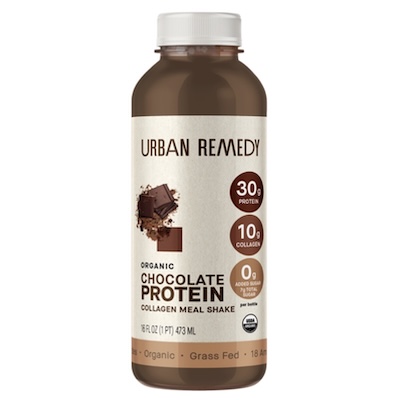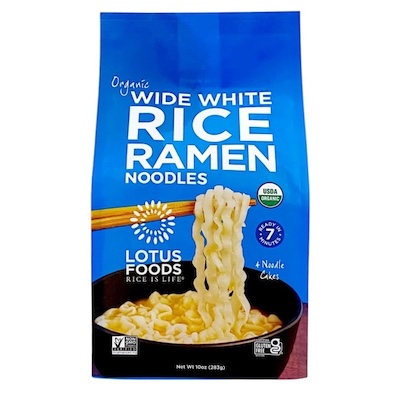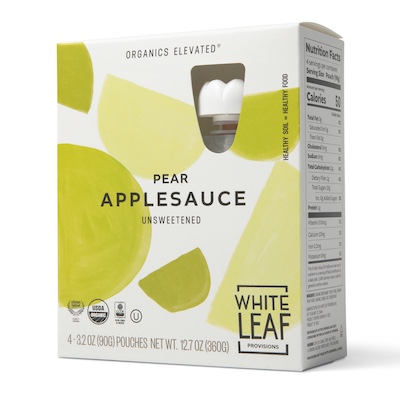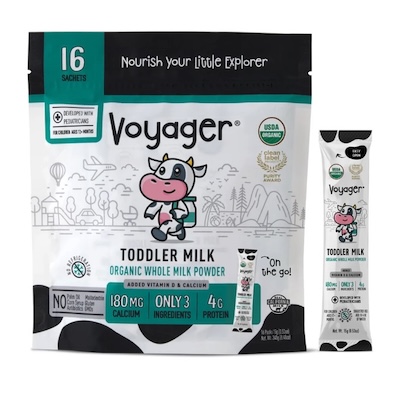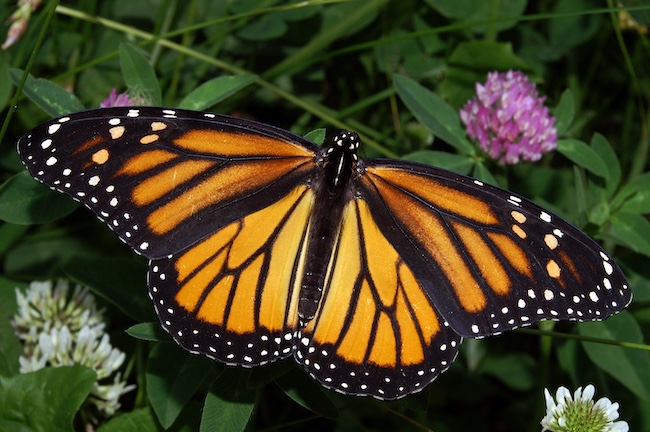
What the Disappearing Monarch Butterflies are Telling Us -- and Why We Should be Paying Attention
(Photo credit to Wikimedia / Kenneth Dwain Harrelson)
How Organic Insider operates: We accept no advertising, we have no paywalls and we make our newsletters free to everyone because vital information about our industry needs to get out to as many people as possible. Please consider supporting our work, whether you are an individual or a company. Thank you so much.
According to the Xerces Society for Invertebrate Conservation, the western monarch butterfly population — an essential pollinator — was counted at 9,119 in 2024, a stunning 96% decrease from the 233,394 counted in 2023.
Even though monarchs are not the primary pollinators for food crops, their decline represents a serious sign of larger environmental issues. It is also an indicator of the overall health and vulnerability of other pollinators, such as bees, birds and bats, who contribute to 35% of the world’s total crop production, pollinating 87 of 115 leading food crops worldwide.
“What is happening to the monarch butterfly mirrors what is happening to the other pollinators, and if the population collapses, we may not be able to recover it,” said Emma Pelton, senior endangered species conservation biologist, western monarch lead at the Xerces Society for Invertebrate Conservation.
“Unfortunately, not all pollinators are nearly as studied nor as recognized by the general public, so their demise gets much less attention. However, they are all very key parts of the entire ecosystem, one that is deeply connected and reliant on each other.”
THE CAUSE AND RESPONSIBILITY
For those who have been fighting to protect monarch butterflies, the culprit behind their disappearance is not in doubt.
“The science is clear: herbicides, such as glyphosate, have decimated milkweed — the monarch caterpillar’s sole food source — on cropland throughout the eastern population’s critical Midwest breeding range,” said Bill Freese, science director at Center for Food Safety. “Meanwhile, drift-prone herbicides, like dicamba, kill or impair reproduction of flowering plants that adult monarchs need for nectar, and insecticides, such as neonicotinoids, poison monarchs directly.”
In Canada, monarchs are listed as “endangered” under the Species At Risk Act, and in Mexico, they are listed as a species of special protection under the country’s law. Additionally, the International Union for Conservation of Nature classifies them as “vulnerable.”
In the U.S., however, the battle to safeguard the monarch butterflies has been anything but easy.
Center for Food Safety, along with its allies at the Center for Biological Diversity, Xerces Society and renowned monarch biologist Dr. Lincoln Brower, petitioned the U.S. Fish and Wildlife Service in 2014 to protect the iconic butterflies under the Endangered Species Act.
Yet, more than a decade later, amidst numerous delays and legal appeals, the agency has still not acted.
While the legal battle makes its way through government channels, some brands are taking proactive steps to help make a difference.
Burroughs Family Farms, a Regenerative Organic Certified® almond farm in California, has been planting milkweed to create habitat for monarchs.
“We have a decline of species, and that alarms us,” said Benina Montes, a fifth-generation owner of her family farm. “It is incumbent on all of us to do what we can to protect these valuable pollinators because our biodiversity and ability to feed ourselves are at stake.”
At the end of the day, the government has a critical role in protecting our food supply, and while the White House is adamant about rolling back regulations, not increasing them, a refusal to restrict insecticide use will have incredibly grave consequences.
“The monarchs’ tragic collapse represents a damning indictment of industrial agriculture and pesticide use,” said George Kimbrell, legal director at the Center for Food Safety. “GMO companies will tell you that these very toxic chemicals are critical to feeding the population. That’s false. The evidence shows that genetically-engineered crops do not increase yield; they only increase pesticide resistance. And worse, the reality is actually that these same toxic chemicals, if left unchecked, will be the single reason that our population cannot grow enough food.”
CURRENT STATUS
In December, the U.S. Fish and Wildlife Service had proposed endangered species protection for monarchs, with a public comment period that closed earlier this month. However, last week, the Trump administration extended the comment period until May 19, 2025.
In support of this listing, Center for Food Safety submitted dozens of scientific studies and sources, and spearheaded a group sign-on letter that was joined by 50 conservation organizations, along with over 16,000 comments from individuals.
It is now up to our country’s leadership to decide what happens next.
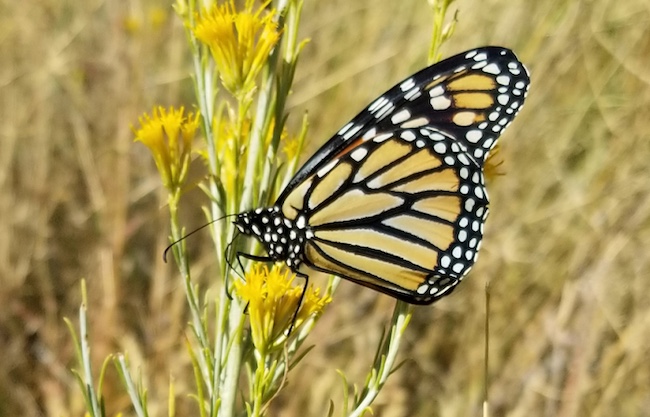 (Photo courtesy of the Xerces Society for Invertebrate Conservation and Stephanie McKnight)
(Photo courtesy of the Xerces Society for Invertebrate Conservation and Stephanie McKnight)
 |
With gratitude, 
Max Goldberg, Founder |
Quick Hits
* This week in Washington, D.C., a 30-person delegation from the National Organic Coalition will be meeting with over 55 Congressional offices and USDA officials to sound the alarm over devastating USDA funding freezes and staff cuts.
* Formerly an intern at Organic Valley, Shawna Nelson has been appointed CEO of the company, the first female to hold this position.
* Rodale Institute, just named as one of the most innovative companies in agriculture by Fast Company, has teamed up with GreenWave to integrate regenerative ocean farming with land farming.
* Kernza® is at the center of the short film Beer Saves the World, which is currently touring the film festival circuit. Here is the trailer.
* Miso Master honors an ancient craft and has become the world’s largest organic producer of a Japanese culinary staple.
* Once Upon a Farm automates case packing for new recycle-ready pouches.
* On April 1st, the Soil & Climate Alliance’s virtual mini-meeting — Breaking the Toxic Cycle: A Call for Global Synthetic Chemical Accountability
* Winners of the 2025 OSC Packaging Innovation Awards.
* The inside story of the UK’s Planet Organic ‘miraculous’ turnaround.
* This organic strawberry sells for $19.99.
New Organic Products
Collagen Meal Replacement Shakes from Urban Remedy
Urban Remedy has just introduced Organic Collagen Meal Replacement Shakes in two flavors -- vanilla (28g of protein) and chocolate (30g of protein). Key to this product is a first-to-market source of organic bovine collagen peptides from sustainably raised grass-fed cowhides. Available at Urban Remedy's grab & go kiosks in Whole Foods Market and online at Whole Foods Market on Amazon.Wide White Rice Ramen Noodles from Lotus Foods
Lotus Foods has announced that its Organic Wide White Rice Ramen Noodles -- a single ingredient, first-of-its-kind innovation -- are now available in more than 3,400 stores nationwide, including Publix, Kroger, Sprouts and Harris Teeter. Additionally, these never-fried, naturally gluten-free noodles can be found at regional and specialty retailers, such as Heinen’s, Erewhon and Earth Fare.Demeter-Certified, Regenerative Applesauce from White Leaf Provisions
White Leaf Provisions has relaunched its organic line of Applesauce, made from apples exclusively sourced from regenerative orchards. Demeter-certified and winner of the Clean Label Project Purity Award, this product contains no added sugar and comes in four flavors -- Mango + Coconut, Pear, Banana and Blueberry. Available at retailers nationwide.Single-Serve Whole Milk Powder Sachets from Voyager
To make it easier to travel with toddlers, Voyager has introduced Single-Serve Whole Milk Powder Sachets. USDA certified organic, sourced from grass-fed cows and developed with pediatricians, they do not need any refrigeration and are TSA-approved. Recipient of the Clean Label Purity Award and made with only 3 ingredients, it contains 180mg of calcium and 4g of protein.
Weekly News Summaries
In Georgia, Bayer hit with $2 billion Roundup Verdict Over Glyphosate
These multi-billion dollar verdicts are not going to last forever, as the company recently introduced new residential lawn and gardening Roundup products that are free from glyphosate -- but 45x more toxic. We wrote about this new formulation last fall.

Organic Milk Sales Continue to Increase
By Lee Mielke
The USDA’s January data shows that organic milk sales, at 276 million pounds, were up 6.5% from a year ago and represented 7.2% of total milk sales in the month.

Lawmakers Face Angry Farmers
By Grace Yarrow and Samuel Benson
Members of Congress faced fiery town halls with concerned farmers and laid-off USDA employees during last week’s recess.

In California, Capistrano set to Serve Even More Organic School Lunches
By Vania Patino
The school district has served more than 80,000 pounds of organic food since last year.

Organically Grown Company Acquires Citrus Supplier
Organically Grown Company, a marketer and distributor of certified organic produce, has acquired Johansen Ranch, a historic family farm in Orland, California.

French Farmers Contend with Drop in Demand for Organic Food
By Sarah Elzas
After double-digit growth the last few years, including throughout the Covid-19 pandemic, organic food is in a free fall in France. Could the same thing happen in the U.S.?

After Trade Dispute, Mexico Officially Bans the Planting of GMO Corn
By Adriana Barrera
The reform, proposed by President Claudia Sheinbaum, aims to protect native corn as an "element of national identity" and may trigger retaliatory measures by the U.S.

Study: Exposure to Combination of Pesticides Increases Childhood Cancer Risk
By Tom Perkins
Exposure to multiple pesticides significantly increases the risk of childhood cancers compared with exposures to just one pesticide, first-of-its-kind research finds, raising new fears that children are more at risk to the substances’ harmful effects than previously thought.

It Goes Beyond Pesticides: The Silent Spread of PFAS in Agriculture
By Alice Bergoënd
The organic sector is very vulnerable to PFAS contamination, particularly for eggs.
Want to share this newsletter on social media? You can use this link: Newsletter Link
The material in this newsletter is copyrighted and may be reprinted by permission only. All requests must be in writing. Please use our contact form to request republication rights.
Newsletter Archive
Quick Hits
* This week in Washington, D.C., a 30-person delegation from the National Organic Coalition will be meeting with over 55 Congressional offices and USDA officials to sound the alarm over devastating USDA funding freezes and staff cuts.
* Formerly an intern at Organic Valley, Shawna Nelson has been appointed CEO of the company, the first female to hold this position.
* Rodale Institute, just named as one of the most innovative companies in agriculture by Fast Company, has teamed up with GreenWave to integrate regenerative ocean farming with land farming.
* Kernza® is at the center of the short film Beer Saves the World, which is currently touring the film festival circuit. Here is the trailer.
* Miso Master honors an ancient craft and has become the world’s largest organic producer of a Japanese culinary staple.
* Once Upon a Farm automates case packing for new recycle-ready pouches.
* On April 1st, the Soil & Climate Alliance’s virtual mini-meeting — Breaking the Toxic Cycle: A Call for Global Synthetic Chemical Accountability
* Winners of the 2025 OSC Packaging Innovation Awards.
* The inside story of the UK’s Planet Organic ‘miraculous’ turnaround.
* This organic strawberry sells for $19.99.
